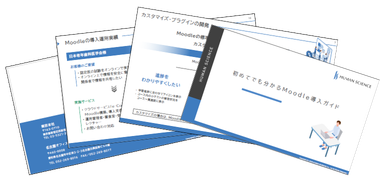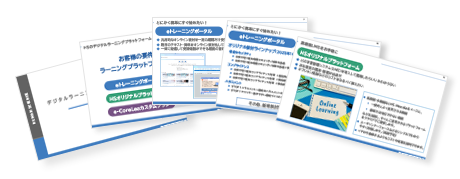2022.08.10
2025.07.06
Moodle Basic Course: What is Moodle?

Table of Contents
1. What is Moodle?
1-1. Overview of Moodle
1-2. How to Get Started with Moodle
2. What is an LMS?
2-1 History and Purpose of LMS
2-2 Recent Trends
3. Points to Consider When Introducing Moodle
3-1 Is Moodle Really Free?
3-2 Is Security Okay Even Though It’s Open Source?
3-3 Can You Utilize It with Only the Standard Features?
4. Summary
4-1 What is Human Science?
4-2 Implementation Design
4-3 Operational Support
1. What is Moodle?

1-1. Overview of Moodle
Moodle is a free, open-source all-in-one learning platform.
According to Moodle HQ statistics, it is the world's largest learning platform with over 140,000 sites, more than 400 million users, and usage in 237 countries and regions. (*As of 2025)
It holds the No.1 share in universities in Europe and Japan, and is widely adopted not only in educational settings but also by global companies, government agencies, and other organizations worldwide.
A major feature is its high level of customization. Flexible customization tailored to the individual goals and needs of each course is possible, allowing it to accommodate any class size, from small courses to large ones.
In addition, it comes with a highly versatile editor that allows for easy incorporation of images and videos, making it simple to create teaching materials. Furthermore, it is compatible with smartphones and tablets, enabling participants to comfortably attend lectures anytime and anywhere.
The main reason Moodle continues to be chosen worldwide is that it is a world-standard LMS, which means it is a system refined and standardized by universities and other organizations around the globe. By using a world-standard system and implementing organizational reforms tailored to the system, it becomes possible to reassess the structure and nature of the organization, thereby enhancing international competitiveness.
*1 e-learning refers broadly to an educational system that utilizes IT technologies centered around computers and the internet. This includes everything from watching videos on sharing sites, solving problems with learning apps, to remote classes conducted through web conferencing tools.
*2 Detailed explanation can be found in "2. What is LMS".
> [Moodle Basic Course] What can the e-learning management system Moodle do?
> [Moodle Basic Course] What can be done with Moodle's default features
1-2. How to Get Started with Moodle
There are two main ways to implement Moodle: "On-Premise" and "Cloud". The installation method varies depending on the implementation approach. In summary, the outlines of each are as follows.
■On-Premises
This refers to the method of installing IT resources such as servers, network equipment, and packaged software within the company or data center, where the users themselves manage and operate them.
■Cloud
This refers to using IT resources provided by cloud vendors over a network. You will pay fees based on your usage.
> Benefits and Considerations of Moodle Cloud Services
How to get started with on-premises:
- 1. Download the latest version from the official Moodle website.
- 2. Unzip the downloaded file and place it in the document root of the web server.
- 3. Access the Moodle installation file (install.php).
- 4. When the installation file is executed, the Moodle installation wizard will be displayed.
- 5. Follow the wizard, enter the required information, and complete the installation.
How to get started with the cloud:
- 1. Choose a cloud service provider for Moodle.
- 2. You will register from the service provider's website.
- 3. Once the registration is complete, a Moodle cloud instance will be automatically created.
- 4. Access the instance and make the necessary settings.
- 5. Create an account to use Moodle and upload learning content.
2. What is LMS?

Learning platforms like Moodle are referred to as LMS.
LMS stands for Learning Management System, which is translated as Learning Management System in Japanese.
LMS is a system that centrally manages information such as participants, materials, progress, and grades necessary for e-learning.
2-1. History and Purpose of LMS
The development of the internet has made online learning (e-learning) more accessible.
In e-learning, materials can be stored on the internet, making it significantly easier to reduce costs and update information compared to traditional textbooks and CDs.
However, being in an open space like the internet has led to two major issues as follows:
・It is necessary to manage participants so that only specified users can access the content.
・It is necessary to communicate the learning policy to each participant regarding which materials to start with.
It is very difficult for course creators and administrators to solve this. This is because it requires specialized knowledge such as internet systems and server management, and it involves a lot of cost and time.
An LMS was developed to solve the above challenges.
By providing a "platform" equipped with the necessary features in advance and allowing for simple operations, administrators can focus on creating teaching materials and providing learning guidance.
Here, we will introduce the basic functions of the LMS, divided into the learner side and the administrator side.
Participant Functions
- ・e-Learning Distribution:
You can distribute "specific materials" to "designated learners" for a "specified period" and have them take the course. - ・Submission of assignments, tests, and surveys:
You can collectively carry out and manage submissions before and after the lectures. - ・Group Training Management:
Participants can easily check the content and apply for participation on the system, and in addition, surveys can be conducted in advance, documents can be attached, and traditional tasks can be managed centrally.
<Administrator Functions>
- ・Organizational Management:
Easily set up a corporate organizational chart within the LMS to facilitate the extraction of target individuals such as departments and divisions. - ・Report creation and management:
This feature allows you to conduct surveys and submit reports on the LMS. After training sessions, it is common to collect surveys and assign report tasks, but aggregating and consolidating such data can be cumbersome, and reminders for those who have not completed them can add unnecessary pressure. With the survey and report features in the LMS, you can automatically distribute surveys at the end of e-learning or training sessions and manage report submissions collectively on the LMS.
2-2. Recent Trends
Recent trends show that social (communication) features are becoming more robust.
It is something like a social networking service that only users can access. Learning is not necessarily a one-way process provided by educators. It can also be considered learning when individuals share their knowledge or engage in discussions, deepening insights for both parties. Terms like "social learning*" are gaining attention, and some LMS have features that enable this.
Unlike one-sided education that clarifies and fixes the roles of the teacher and the learner, this approach is characterized by participants teaching and learning from each other interactively through a network. In companies, by sharing knowledge with each other within the organization or beyond, each employee fosters innovation and improves performance.
Reference URL:
> Non-Profit Organization Digital Learning Consortium
3. Things to Consider When Implementing Moodle

So far, we have introduced the features and characteristics of Moodle. In this chapter, we will discuss three points to keep in mind when actually implementing it.
3-1. Is Moodle really free?
It is provided free of charge under the conditions of the GPL※ as open-source software. No license fee is required for use.
When introducing Moodle, the following costs are required.
・Server cost when using a rental server
・Cost of an administrator with technical knowledge of servers, such as selecting hardware specifications and installing middleware, when operating on-premises
* GPL (GNU General Public License) is a license that sets forth the terms of use for software, referred to in Japanese as a general public use license. It mainly consists of two points: 1) It allows for free use, redistribution, modification, and the creation and distribution of derivative software. 2) For derivative software (modified software or software used in conjunction), it stipulates the publication, use, redistribution, and modification of the source code based on the GNU GPL license.
3-2. Is security okay despite being open source?
Moodle is open source, so users must take measures for maintenance and operation.
There is also a security manual on the Moodle site, which is constantly updated, but it is not perfect.
The vulnerabilities found in the past allowed hackers to change test and homework grades, as well as register or unregister learners from classes, affecting Moodle users worldwide.
Reference article(https://www.hackread.com/6-year-old-moodle-account-takeover-vulnerability/)
> Moodle Basic Course: Moodle Security Measures
> Moodle Maintenance and Operations
3-3. Can it be utilized with standard features only?
It is recommended to set up a demo site to check the actual functionality and tune the settings and features to see if it can be utilized with standard functions alone.
Moodle comes with a rich set of standard features, but for functionalities that are difficult to achieve with these alone, you can add features through customization (*1) or plugin development (*2).
*1 For customization (modification of standard functions), since it involves modifying the Moodle core, it is necessary to reapply the modifications when upgrading the version.
Examples of customization: linking with user data from already operating portal sites or other systems, streamlining operational tasks, etc.
*2 For plugin development (adding functions not included in standard features), since migration can be done with simple testing when upgrading, it is less likely to be affected.
Examples of plugin development: mail plugins (scheduled, inquiry mail sending), acquiring video viewing history, etc.
Reference URL:
> 4 Key Points for Comparing e-Learning and LMS (Learning Management Systems) | e-Learning Blog | e-Learning by Human Science (hs-learning.jp)
> Moodle Basic Course: What You Can Do with Moodle's Default Features
> 4 Key Points for Comparing e-Learning and LMS (Learning Management Systems)
> Moodle Plugins and Customization
4. Summary

In the previous chapter, we discussed what to be careful about when implementing Moodle.
Of course, it is possible to operate Moodle on your own, but
to make the most of Moodle, it is advisable to seek the help of an official Moodle partner.
There are several official Moodle partners in Japan, and this time we will introduce Human Science Co., Ltd., which has a wealth of experience.
4-1. What is Human Science?
Human Science is an official partner of Moodle*. In 2017, we were certified by the Moodle headquarters in Australia and became an official Moodle partner. Only companies with expertise and a proven track record in building and developing Moodle are certified. While certified companies exist around the world, there are only a few in Japan.
We leverage the know-how and the number one domestic operational track record (over 700 projects, more than 80 cases with companies, schools, and organizations) to provide total solutions from the introduction to operational support of Moodle.
Next, we will explain the services provided by Human Science step by step.
4-2. Implementation Design
<Client Situation Hearing and Proposal>
We will assist in configuring Moodle to realize the educational flow that the client wants to implement.
Moodle has a wealth of features, so we will make it user-friendly for learners by anticipating how it will be used. The configuration of Moodle allows you to show/hide features.
- ・Requirements Definition
We will listen to what the customer wants to achieve with the implementation of e-learning and finalize the specifications. - ・Support for Building e-Learning Operation Business Processes
e-Learning operations involve various tasks such as course registration, communication with users, distribution, and effectiveness measurement. We assist in constructing business flows to ensure the success of implementation and operation. - ・Building a Demo Site
We will launch a demo site and tune the settings and features while allowing customers to see the actual operation of Moodle.
> Moodle Implementation Support and Operation
<Moodle Construction>
We will install Moodle and make it ready for use.
We can build it on-premises (owned and operated by your company) as well as on cloud platforms like AWS and Azure.
We also perform replacements from your existing systems to Moodle.
- ・ Selection of hardware specifications
Determined by the number of users and how it is used. - ・ Installation of Middleware
We will install open-source middleware such as apache (Nginx), php (php-fpm), and postgresql. - ・ Installation of Moodle
- ・ Moodle Configuration
Configuration of Moodle will be done based on the intended use. - ・Customization, Plugin Development
We will carry out customization and plugin development for features that are difficult to achieve with only the standard functions of Moodle.
We also offer a cloud service called e-CoreLea.
You can use an environment where Moodle is already installed and set up, so there is no need for customers to prepare or build servers, networks, or perform installation and initial configuration.
We also have video distribution plans and plans that include educational content. Please contact us for more details.
4-3. Operational Support
<Usage Seminar>
A seminar will be held on the basic usage of Moodle.
It is expected to be in a lecture format using a web conferencing system (such as Zoom) for about 5 hours a day. The content will include preparation, user registration, course registration, quiz creation, downloading grades, and creating surveys.
<Operation Manual>
A tutorial manual will be created on how to use Moodle.
> Moodle Implementation, Seminars, Manuals
<Regular Maintenance (Version Upgrade)>
Moodle has many versions available.
Human Science supports version upgrades.
> Moodle Version Upgrade
<Inquiry Support>
We provide Moodle support services via phone and email.
The biggest advantage of Moodle is that it is open source and free, but maintenance and operation are the user's responsibility.
The main contents include the following:
> Moodle Maintenance and Operation
- ・Phone and email support for inquiries regarding Moodle operations
- ・Delivery of a report summarizing the inquiry details as a monthly report
- ・Investigation into the cause of the Moodle bug (fix will be handled separately)
We provide support for Moodle operations and management, as well as regular maintenance such as frequent Moodle updates
and server environment upgrades, along with new information about new features.
> Frequently Asked Questions about Moodle Implementation and Support
From the above, it is clear that Human Science provides support from the introduction to the operation of Moodle. For those who would like to know more details, you can obtain the materials from the link below.
At Human Science, we offer a variety of services to help our clients implement and operate e-learning.
If you have any concerns, please feel free to contact us.
> e-learning material production
> e-learning material translation
> in-house material support
> Articulate Storyline, Studio implementation support and creation agency services
> microlearning implementation support
> Flash to HTML5 migration and conversion
> Moodle and Totara Learn (open-source LMS) implementation and operational support
For the contact form, click here(https://hs-learning.jp/contact/)
Contact Information:
Phone Number: 03-5321-3111
hsweb_inquiry@science.co.jp
Moodle Introduction Guide for Beginners

We explain the process of introducing and operating Moodle.
For the introduction and operation of Moodle, please leave it to Human Science, the official partner. We also introduce many achievements in Moodle implementation support.
Projects: Over 866
Companies, Schools, Organizations: Over 80 cases












